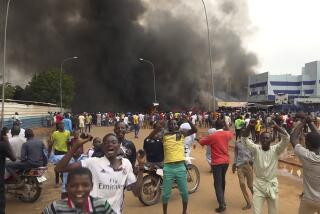Refugee Airlift to Rwanda Blocked by Rebels in Zaire
KINSHASA, Zaire — In an ominous development threatening more than 100,000 exhausted Rwandan refugees facing starvation and disease in eastern Zaire, rebels blocked the United Nations on Friday from starting a massive airlift to carry them home.
The Hutu refugees have been on the run since 1994 and are on their last legs, dying at a rate of about 60 a day, although that rate is half that reported earlier this month. Officials of the Office of the U.N. High Commissioner for Refugees believe that it is imperative for the airlift to go ahead.
But officials of the rebel alliance that now controls the major eastern city of Kisangani refused permission, saying refugees brought into town to reach the only available airport would spread deadly cholera to the local population.
Rebel radio stations, meanwhile, have been broadcasting incendiary reports, whipping up anti-refugee feelings that contributed to riots Friday against the refugees and the aid workers trying to help them.
U.N. refugee agency spokesman Peter Kessler, speaking from Nairobi, Kenya, emphasized that there have been no cases of cholera in the Biaro camp, 25 miles south of Kisangani, from which the first group of 80 refugee children was to be airlifted.
The cholera that has been detected in another camp is a mild strain and could easily be controlled, he added.
“We’ve been waiting for a clear answer on the airlift . . . which has been in the planning for almost a month,” Kessler said. “Now, because of this outbreak and other issues, we are having to start over.”
Using a small fleet of Russian-made Ilyushin and U.S.-made C-130 transport planes, U.N. officials have been rushing to organize what could become the largest civilian emergency airlift in history.
Some of the refugees--who are a remnant of the massive exodus from Rwanda of ethnic Hutus who fled after the 1994 genocide in their country--have walked more than 400 miles in the past six months and are too weak to survive a trek home on foot through dense countryside.
*
Most of the refugees had been living in huge tent cities near Goma, just outside Rwanda, until they were uprooted by the Zairian rebel uprising late last year that has since gone on to take control of half of Zaire, threatening the 32-year grip on power of President Mobutu Sese Seko.
Many of the rebels are ethnic Tutsis who detest the refugees as part of Rwanda’s former Hutu community responsible for the genocide, which killed more than half a million Tutsis in Rwanda in a period of two months--one of the worst crimes against humanity in this century. Other Zairians view the refugees as little more than interlopers, foraging for food and stealing their crops.
After the genocide, the tables quickly turned on the Rwandan Hutus. A Tutsi guerrilla army took power in Rwanda in July 1994, and about 2 million Hutus--led by the former government and the defeated Rwandan army--fled to Zaire and other neighboring countries.
Although cholera has been reported among the refugees--about 25 have died out of a total of 330 victims of the disease--that is not a reason to block the airlift, health officials have said. Moving the refugees out of the area would in fact decrease the chances of an epidemic spreading, they have said.
Cholera can be easily defeated with clean water and basic hygiene. The greater killers of the refugees are malaria and hunger, and the solution for those threats also would be moving the refugees back to Rwanda.
Under the U.N. plan, the refugees are to be flown from the Zairian interior to Goma. From there, they would be transported back by land, joining hundreds of thousands of former Hutu refugees who went back on their own late last year.
As the U.N. refugee agency struggles to get the airlift going, attempts to give humanitarian aid to the refugees around Kisangani have been severely hampered by the rising emotions.
Hundreds of angry Zairians stopped aid workers from reaching camps in Kisangani on Friday after a radio report that the Hutu refugees had killed six Zairian civilians and a rebel soldier.
In one incident, Kessler said, a mob surrounded aid workers’ cars and pounded on them, even pulling the fender off one vehicle. After that incident, aid groups were advised to stay away from the camps temporarily.
The refugee agency said it had halted its operations and advised other foreign aid workers not to visit the camps until it could get security guarantees from rebel officials in Kisangani.
Meanwhile, the United States on Friday ordered dependents of its embassy staff to leave Zaire and strongly urged all Americans--numbering about 450--to depart the country.
The State Department’s written announcement that it had “ordered the departure of dependents of U.S. Embassy personnel” reflected growing U.S. concern about the situation there.
More to Read
Sign up for Essential California
The most important California stories and recommendations in your inbox every morning.
You may occasionally receive promotional content from the Los Angeles Times.










